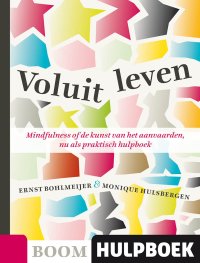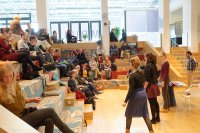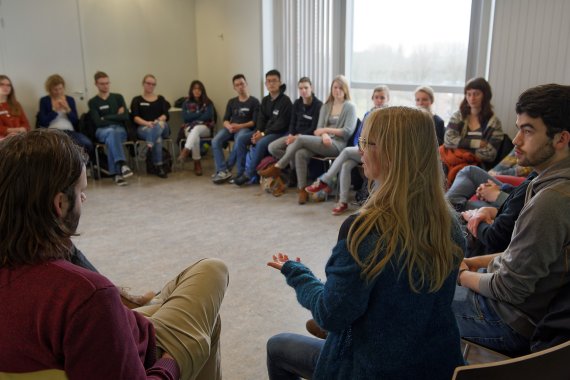Photos Guy Ackermans illustration Geert-Jan Bruins
Who for?
Master’s students
Who by?
Marjan Wink, teacher of Intuitive Intelligence
Where?
Wageningen University, the Forum
How long?
Three weeks (1.5 points) or one period (3 points)
What?
This MOS module is about how you can use your intuition, creativity, experience and inspiration in the pursuit of science.
Marjan Wink: ‘Intuitive Intelligence scored so highly in the evaluations that the course won the prize for excellent education in 2014. That didn’t surprise me actually, because there is such a great need for more self-knowledge. Students want to learn how to listen to themselves more and they need resources for searching self-reflection. They struggle with questions like: who am I, what am I doing and what am I contributing in the world? Society is very knowledge-oriented but how do you place that in a bigger perspective and how does it help to give life meaning?
Intuition can be described as a kind of insight, a form of direct knowledge not reached through conscious reasoning. The course provides insight into unconscious thought processes, which are often more holistic than conscious thought processes of the kind that are important in science and the like. Central questions on the course are: how do you go about making important decisions, and what influences you? What do you rely on? Where do your ideas come from and which conditions help you to have good ideas?
The course is geared to making students more conscious of the balance between head, hands and heart. There are students who lose their passion and their urge to act in the course of their studies – which primarily call on their powers of reasoning. But it can also work the other way round: there are students who follow their passions so wholeheartedly that they can’t concentrate on their studies. I offer students tools for listening to themselves and to others better, using for example mindfulness exercises and visualizations. So the course helps expand their self-knowledge, self-acceptance and self-awareness.
Dialogue is extremely important in this field and in the module, and that helps students to learn that they are not alone in their vulnerabilities or insecurities. What is more: everyone has their own strengths and weaknesses and that insight generates more self-acceptance.
Intuitive intelligence is helpful too in giving meaning to your own life: where does my intuition take me, and how should I approach it then? We automatically tend to make decisions with our heads, whereas basing decisions on intuition and passion makes choosing easier.
I get a lot of students who have been referred by the dean or study advisor, perhaps because they are suffering from too much stress. There is a lot of pressure on students. Students are extremely focused on ticking off courses and if they can’t keep up the tempo that is often seen as their own fault. We are living in a time in which we are very focused on the outside world: what is expected, how do people see me? Turning within, listening to yourself and to your body, and having the courage to make space for that is a skill. If you develop that skill you will be more energetic, more efficient and happier. And you will find a better balance between your private life and your studies.’
Who for?
Students who see a student psychologist
Who by?
Student psychologist Ineke Leenders
Where?
Wageningen University, Axis
How long?
Two months
What?
The training is based on Acceptance and Commitment Therapy, and is intended for people suffering from symptoms of depression, burnout or (mild) anxiety. The training is part of the treatment and is only available after an intake interview.
Ineke Leenders: ‘The basic idea behind the training is that you learn to accept what can’t be changed, so that you no longer have to fight it in vain. At the same time you learn to invest more energy in the things you value. Mindfulness is one part of the course, which comes down to living more in the here and now and not brooding on the past or worrying about the future. Mindfulness is a proven method of dealing with stress and depression. Students also say that after the training they are less troubled by distressing thoughts and can put them in perspective better. It has also become clear that students benefit from sharing things in the group, so that they realize they are not alone in facing such things.
There are various signals that can flag up an approaching burnout, such as the feeling that you are always in a hurry, always on the alert, don’t enjoy things or feel motivated anymore, and only do things because you have to. You can compare it with a car whose engine goes on running when it’s stationary. Even when you do have some time to yourself you can’t relax. A burnout is never solely caused by someone’s studies, but is often the sum of several different factors. Some character types are more vulnerable to it than other, especially perfectionists or people with an exaggerated sense of responsibility or need to please.

Students are in an age group in which things change incredibly fast. I see insecure first-years as well as people who are ready for working life. An incredible development takes place in just a few years. Precisely because of that dynamism, something can easily go wrong. Another thing I notice is that students don’t just want to do their course perfectly, but everything. They must have a social life, they mustn’t miss out on anything, they must be on committees because that’s good for their CVs, and it all has to happen fast and right now. That makes for a risk of going well beyond your limits.
What I would actually like to raise with all students is the balance between the load you are carrying and your carrying capacity. It’s all very well to want to do a lot, but you have to have the strength to do it too. Resilience requires maintenance, and you can achieve that by paying attention to basic things like a healthy diet, sufficient sleep, sport and relaxation. Take good care of yourself.’
Workshop ‘Dealing with stress’
Who for?
All students
Who by?
Inspringtheater, part of Boerengroep foundation
Where?
On Wageningen Campus and other venues
How long?
45 minutes
What?
Inspringtheater, or ‘theatre of the oppressed’ is a form of interactive theatre. After a short play on a particular topic, the actors enter into dialogue with the audience. After that, members of the audiences can take over the roles from the actors.
Maureen Klijn, coordinator of Het Inspringtheater: ‘I have noticed that stress is a very relevant topic for young people. Everyone wants to do a lot, and has a lot of ambitions. At the same time, people are asking, ‘who am I and how do I show who I am?
The previous coordinator of Het Inspringtheater, Marloes Harkema, came up with the idea of creating a show about stress, for and by students at Wageningen University. When I took up her idea, I saw that it was a hot topic.
When we were preparing the play I asked a lot of people what stresses them out. I have heard from friends that social media, and Facebook especially, cause a lot of stress. Facebook is a kind of mirror, a way of comparing yourself with others, and that causes stress. It is difficult to stay in the now, whereas I think that is the solution to stress.

Although stress and burnouts are happening a lot among young people, I have noticed that they are still taboo subjects. Society sees it as your own fault if you get a burnout. People who get them are therefore likely to feel they are losers. Whereas I think precisely the people who get burnouts are very strong people who lead rich lives. They do a lot and have a lot of ambitions. What I would like to achieve through this show is to break the taboo and open up a discussion.
Het Inspringtheater is not therapy but by doing it, by taking on a role in the show, people can get close to their feelings and that creates space. You get a new perspective on the situation. A discussion starts up in the interactive bit and there is room for reflection and light-heartedness. Het Inspringtheater doesn’t necessarily aim at a solution or an answer, but shows people different ways of going about things. I hope that after the show people can stay truer to their own needs and make clearer where their limits lie.
More study stress
The number of students going to the student psychologists at Wageningen University for help was more than 30 percent higher in 2014 than in 2013, show the psychologists’ annual figures. This cannot entirely be explained by the increase in student numbers, because the percentage of students seeking help rose too, from 6.8 to 7.2. The number of students with study-related stress symptoms went up the most, say the psychologists. The increased interest in the course on Intuitive Intelligence could be another sign of the importance to students of living more mindfully and dealing with stress. In the academic year 2013-2014, the course was taken by 130 students; one year later there were 204 students on the course.

